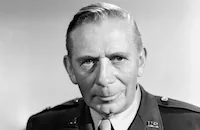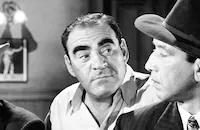Kill the Umpire

Brief Synopsis
Cast & Crew
Lloyd Bacon
William Bendix
Una Merkel
Ray Collins
Gloria Henry
Richard Taylor
Film Details
Technical Specs

Synopsis
When spring training begins in St. Petersburg, Florida, avid baseball fan Bill Johnson cannot keep away and has lost several jobs because of his obsession. Bill, a former baseball player, is married to Betty, the daughter of retired umpire Jonah Evans, but has total contempt for umpires. When Bill loses yet another job, Jonah suggests that he become an umpire and earn his living at the ballpark. After much protest, Bill agrees to attend an umpires' school run by Jonah's friend Jimmy O'Brien, but determines to do everything he can to get kicked out of the school. After many intentional blunders, Bill is asked to leave. While waiting for the train home, Bill breaks up a fight at a boys' softball game, and the players ask him to act as umpire. The experience helps Bill understand the value of the umpires, and he begs Jimmy to take him back. This time, Bill works hard to succeed. The night before graduation, Bill studies late and the next morning uses some eye drops belonging to his roommate, Roscoe Snooker, to soothe his eyes. The drops cause him to see double, and consequently, Bill makes every call twice, earning him the nickname "Two Call Johnson." After graduation, Roscoe and Bill are assigned to the Texas League, where Bill's tough but fair calls make him popular with the fans. Then a group of gamblers try to bribe Bill, and when he refuses them, they unsuccessfully try to frame him. Bill's honesty causes him problems with the fans, however, when, during a close game, he makes a difficult call and is attacked by one of the gamblers. He then orders the game forfeited to the other team. Hearing the news, Bill's family rushes to his side. Angry fans mass outside the hotel where Bill is staying, but despite the danger, Bill is determined to call that night's game. Through a ruse, Bill evades the crowd outside the hotel and, after being chased by the irate gamblers, Bill and Roscoe arrive at the field. There, Bill's controversial call is validated by the catcher, who has recovered from the injuries that earlier prevented him from speaking in Bill's favor, and the game proceeds.

Director

Lloyd Bacon
Cast

William Bendix

Una Merkel

Ray Collins

Gloria Henry
Richard Taylor

Connie Marshall

William Frawley

Tom D'andrea
Luther Crockett
Jeff York
Glenn Thompson

Bob Wilke
Jim Bannon

Alan Hale Jr.
Charles Cane
Bob Ryan
James O'gatty
Charles Sullivan

Joseph Crehan
William Newell
Emory Parnell
Raymond Largay
Joe Palma
Tom Hanlon
Frank Hagney
Ralph Volkie
Larry Barton
Dudley Dickerson
Harry Hayden
Stanley Blystone
Murray Alper
Bill Lechner
Mike Mahoney

Jean Willes
Ward Wood
Lois Hall
Douglas Evans

Ralph Dunn
Vernon Dent
Lyn Thomas
Ed Peil Sr.
Edythe Elliott
Chili Williams
Joe Recht
Kernan Cripps
Eric Bergman
Edward Harris
Raymond W. Snyder
Dewey Widmer
Francis Mcdonald
Art Jacobs
Larry Mcgrath
Matt Mchugh
Jerry Mickelsen
Ralph Littlefield
Harry Tyler
Phil Mazzeo
Ralph Cunningham
Dick Wessel

Billy Gray
Cliff Dapper
Gilly Campbell
Jean Pierre Roy
George Metkovich
Irv Noren
Murray Franklin
Gerald Priddy
Duke Snider
Tommy Ivo
Ted Dean
Lou Stringer
Jim Baxes
William "bill" Phillips
Andrew Skurski
Frank Kelleher
Bill Schuster
Fred Millican
Pinky Woods
Willard Ramsdell
Chuck Herman
Edward Oliver
Bill Van Winkle
Chief Yowlachie
Myron Healey
Smoki Whitfield
Grace Hampton
Larry Olsen
Sam Balter
Jerry Wald
Almira Sessions
Mickey Simpson
Henry Kulky

Karen Randle
Joyce Otis
Shirley Ballard
Tony Taylor
Jackie Jackson
Bob Perry
Mike Lally
Johnny Kascier
Warren Mace
Leslie Sketchley
Ray Dawe
Wally Rose
Leo Sulky
Al Thompson
George Lloyd
Richard Bartell
Chester Clute
Kid Chissell
William Norton Bailey
Pat O'malley
Alan Schute
Ted Jordan
Bert Lebaron
Pat Moran
Tommy Mann
Donald Kerr
Jack Gargan
Jack Gordon
Phillip Adams
Emil Sitka
Bud Osborne
Charles Hamilton
Al Hill
Crew
John Beck
James Crowe
Lambert Day
Carter Dehaven
Charles Lawton Jr.
Jean Louis
Wilbur Mcgaugh
Charles Nelson
Heinz Roemheld
Perry Smith
Morris Stoloff
Frank Tashlin

Film Details
Technical Specs

Articles
Kill the Umpire
Mostly, though, it rides the sturdy, lovable lug persona of William Bendix. He played his share of thugs and primitives, slapping Alan Ladd around in Dashiell Hammett's The Glass Key (1942) and convincingly shoveling coal into a ship's boiler in Eugene O'Neill's proletarian sympathy vote, The Hairy Ape (1944). But mostly this son of Manhattan, born in the shadow of the Third Avenue El to a family with classical music in its DNA, is remembered as the personification of lunch-bucket, working class icon Chester A. Riley. Bendix's The Life of Riley was a radio hit that handily survived the transition to TV and got the movie treatment, too (1949), partly because burly Bendix, good-natured and sincere, if not too bright, satisfied the image radio listeners had of him, with his mastery of the slow burn and his immortal tag line: "What a revoltin' development DIS is!"
His character in Kill the Umpire, Bill Johnson, is faced with only one revolting development, but it's a big one. He's an ex-ballplayer who can't keep a job because his bosses always catch him sneaking off to the ballpark and firing him. The film was made just in time - only a few years later most ballgames would be played at night, and he wouldn't have had this problem. His wife (Una Merkel) suffers, but not silently, although his two daughters (one engaged to a ballplayer) are more sympathetic. His father-in-law (Ray Collins) suggests Bill become an umpire, so he'll always be where he wants to be now that his playing days are over. The only snag is that Bill has been taught to believe that umpires are the planet's lowest life form. Having no choice, though, he heads off to umpire school, but with an agenda. He's determined to flunk out, preferring unemployment to what he regards as the ultimate baseball disgrace.
The school's head, Jimmy O'Brien (William Frawley, soon to be immortalized on TV's I Love Lucy) is inclined to oblige him, but when the grizzled old pro gets a phone call from his buddy, Bill's father-in-law, he grits his teeth and remains blind to Bill's buffooneries. For a time. He finally blows up and pitches Bill out of the school. But when Bill, waiting for the train back home, umpires a sandlot game and discovers that umpires do indeed have a raison d'etre, he relents, begs his way back in and gets serious about his profession-to-be. He soldiers through a torrent of sight gags, involving an over-inflated chest protector, being stuck to the floor when he jumps off a bench wearing spikes, and misappropriating the eye drops of his roommate (Tom D'Andrea), then starts seeing double while working behind the plate.
When he starts calling "ball, ball" and "strike, strike" some league scouts are taken with what they think is his emphatic manner and passion for the game. (Bendix's passion for baseball was the real thing - as a teen he was a batboy for the Giants and Yankees, and was trusted to run errands for Babe Ruth, although the less said the better about Bendix's heartfelt but off-base The Babe Ruth Story of 1948.) Nicknamed "Two Call" Johnson, Bill gets a job in the Texas League. (Names just don't get more Texan than the name of the league boss, Sam Austin!) Bill does OK until two things happen. Gamblers slip him a bribe to favor the team they bet on (not knowing that straight arrow Bill immediately reported it to the league office) and a controversial call at the plate has an entire Texas town camped outside his hotel ready to lynch him (the film seems shockingly unaware of how chilling and unfunny the lynch mob stuff is!). The only one who can back Bill's call is the catcher who bobbled the throw, but he's lying unconscious in a hospital.
Which brings us to Frank Tashlin. Lloyd Bacon directed Kill the Umpire, but that studio veteran, while justly remembered for some classic musicals -- 42nd Street (1933), Footlight Parade (1933) - really was out of his element with this slight material. Tashlin, who began his own directing career a year later with Bob Hope in The Lemon Drop Kid (1951), later became best known for helming Jerry Lewis comedies. Here, he gets story and screenwriting credit and it's his thumb print that seems most evident. Before he worked in feature films, he spent 20 years as an animator for Max Fleischer, Disney and Warners and it shows.
Kill the Umpire is filled with what were to become Tashlin's trademark eruptions of slapstick, as if in the hope that their manic energy would bring to life characters he sensed were hollow but didn't know how to flesh out, much less get inside. Thus, Kill the Umpire is capped by a big car chase. Bill and his buddy race by ambulance to the ballpark for the big game Bill refuses to back away from calling, with murderous townspeople and angry, trigger-happy gamblers flooring it in hot pursuit. Not that any of it is to be taken too seriously, though. Certainly it doesn't take itself seriously, which is one of its virtues, even if it means giving a free pass to some of the cultural assumptions on which it rests. Innocence has its disarming side, and Bendix uses it to carry the rest.
by Jay Carr

Kill the Umpire
Quotes
Trivia
Notes
A number of players from the Hollywood Stars, a minor league baseball team, appeared in the film. The players included Jim Baxes, Irv Noren, Murray Franklin, Lou Stringer, Frank Kelleher, Bill Schuster, Pinky Woods, Chuck Herman, Cliff Dapper, Jean Pierre Roy and Edward Oliver. Major league ballplayers George "Catfish" Metkovich, Gerry Priddy, Gilly Campbell, Willard Ramsdell and Duke Snider also appeared in the cast. Some scenes were shot on location at Gilmore Field in Los Angeles, the home ballpark of the Hollywood Stars.














